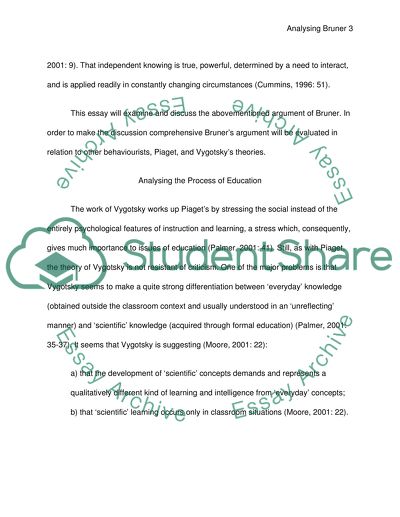Cite this document
(Process of Learning Term Paper Example | Topics and Well Written Essays - 1750 words, n.d.)
Process of Learning Term Paper Example | Topics and Well Written Essays - 1750 words. https://studentshare.org/education/1575796-bruner-argued-that-you-can-teach-any-child-any-subject-at-any-age-in-an-intellectually-responsible-way-critically-discuss-what-he-meant-by-this-with-reference-to-theories-of-behaviourists-piaget-and-vygotsky-and-to-classroom-practice
Process of Learning Term Paper Example | Topics and Well Written Essays - 1750 words. https://studentshare.org/education/1575796-bruner-argued-that-you-can-teach-any-child-any-subject-at-any-age-in-an-intellectually-responsible-way-critically-discuss-what-he-meant-by-this-with-reference-to-theories-of-behaviourists-piaget-and-vygotsky-and-to-classroom-practice
(Process of Learning Term Paper Example | Topics and Well Written Essays - 1750 Words)
Process of Learning Term Paper Example | Topics and Well Written Essays - 1750 Words. https://studentshare.org/education/1575796-bruner-argued-that-you-can-teach-any-child-any-subject-at-any-age-in-an-intellectually-responsible-way-critically-discuss-what-he-meant-by-this-with-reference-to-theories-of-behaviourists-piaget-and-vygotsky-and-to-classroom-practice.
Process of Learning Term Paper Example | Topics and Well Written Essays - 1750 Words. https://studentshare.org/education/1575796-bruner-argued-that-you-can-teach-any-child-any-subject-at-any-age-in-an-intellectually-responsible-way-critically-discuss-what-he-meant-by-this-with-reference-to-theories-of-behaviourists-piaget-and-vygotsky-and-to-classroom-practice.
“Process of Learning Term Paper Example | Topics and Well Written Essays - 1750 Words”. https://studentshare.org/education/1575796-bruner-argued-that-you-can-teach-any-child-any-subject-at-any-age-in-an-intellectually-responsible-way-critically-discuss-what-he-meant-by-this-with-reference-to-theories-of-behaviourists-piaget-and-vygotsky-and-to-classroom-practice.


